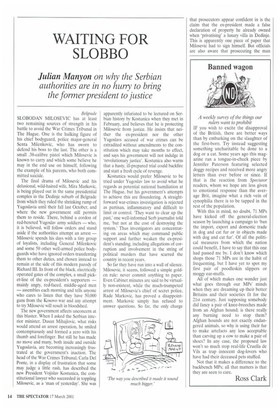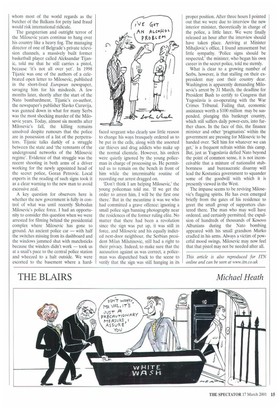WAITING FOR SLOBBO
Julian Manyon on why the Serbian
authorities are in no hurry to bring the former president to justice
Belgrade SLOBODAN MILOSEVIC has at least two remaining sources of strength in his battle to avoid the War Crimes Tribunal in The Hague. One is the hulking figure of his chief bodyguard, police major-general Senta Milenkovic, who has sworn to defend his boss to the last. The other is a small .38-calibre pistol which Milosevic is known to carry and which some believe he may in the end use on himself, following the example of his parents, who both committed suicide.
The final drama of Milosevic and his delusional, wild-haired wife, Mira Markovic. is being played out in the same presidential complex in the Dedinje suburb of Belgrade from which they ruled the shrinking rump of Yugoslavia until their fall last October, and where the new government still permits them to reside. There, behind a cordon of red-bereted Yugoslav army soldiers — who, it is believed, will follow orders and stand aside if the authorities attempt an arrest — Milosevic spends his days with a tiny group of loyalists, including General Milenkovic and some 50 other well-armed police bodyguards who have ignored orders transferring them to other duties, and chosen instead to remain at the side of this modern parody of Richard III. In front of the black, electrically operated gates of the complex, a small picket-line of the ex-president's supporters — mainly angry, red-faced, middle-aged men — assembles each morning and tells anyone who cares to listen that they have 50,000 guns from the Kosovo war and any attempt to try Milosevic will result in bloodshed.
The new government affects unconcern at this bluster. When I asked the Serbian interior minister, Dusan Mihajlovic, what risks would attend an arrest operation, he smiled contemptuously and formed a zero with his thumb and forefinger. But still he has made no move and many, both inside and outside Yugoslavia, are becoming increasingly frustrated at the government's inaction. The head of the War Crimes Tribunal, Carla Del Ponte, in a display of frustration that some may judge a little rash, has described the new President Vojislav Kostunica, the constitutional lawyer who succeeded in toppling Milosevic, as a 'man of yesterday'. She was apparently infuriated to be lectured on Serbian history by Kostunica when they met in February, and believes that he is protecting Milosevic from justice. He insists that neither the ex-president nor the other Yugoslays accused of war crimes can be extradited without amendments to the constitution which may take months to effect, and says his government will not indulge in 'revolutionary justice'. Kostunica also warns that a hasty, ill-prepared trial could backfire and start a fresh cycle of revenge.
Kostunica would prefer Milosevic to be tried under Yugoslav law to avoid what he regards as potential national humiliation at The Hague, but his government's attempts to achieve this are floundering. A straightforward war-crimes investigation is rejected as partisan, inflammatory and difficult to limit or control. 'They want to clear up the past,' one well-informed Serb journalist told me, tut not at the cost of destroying the system.' Thus investigators are concentrating on areas which may command public support and further weaken the ex-president's standing, including allegations of corruption and involvement in the string of political murders that have scarred the country in recent years.
So far they have run into a wall of silence. Milosevic. it seems, followed a simple golden rule: never commit anything to paper. Even Cabinet minutes are said to be virtually non-existent, while the much-trumpeted arrest of Milosevic's chief of secret police, Rade Markovic, has proved a disappointment. Markovic simply has refused to answer questions. So far, the only charge that prosecutors appear confident in is the claim that the ex-president made a false declaration of property he already owned when 'privatising' a luxury villa in Dedinje. This is apparently one piece of paper that Milosevic had to sign himself. But officials are also aware that prosecuting the man whom most of the world regards as the butcher of the Balkans for petty land fraud would risk international ridicule.
The gangsterism and outright terror of the Milosevic years continue to hang over his country like a heavy fog. The managing director of one of Belgrade's private television channels, a massively built former basketball player called Aleksandar Tijanic, told me that he still carries a pistol, because 'it's not all over yet'. In 1998 Tijanic was one of the authors of a celebrated open letter to Milosevic, published in the short-lived European newspaper, savaging him for his misdeeds. A few months later, shortly after the start of the Nato bombardment, Tijanic's co-author, the newspaper's publisher Slavko Curuvija, was gunned down in what for many Serbs was the most shocking murder of the Milosevic years. Today, almost six months after Milosevic's fall, the killing remains unsolved despite rumours that the police are in possession of a list of the perpetrators. Tijanic talks darkly of a struggle between the state and the remnants of the underground networks of the Milosevic regime'. Evidence of that struggle was the recent shooting in both arms of a driver working for the newly appointed head of the secret police, Goran Petrovic. Local experts in the reading of such signs took it as a clear warning to the new man to avoid excessive zeal.
A key question for observers here is whether the new government is fully in control of what was until recently Slobodan Milosevic's police force. I had an opportunity to consider this question when we were arrested for filming behind the presidential complex where Milosevic has gone to ground. An ancient police car — with half the switches missing from its dashboard and the windows jammed shut with matchsticks because the winders didn't work — took us at a snail's pace to the central police station and wheezed to a halt outside. We were escorted to the basement where a hard faced sergeant who clearly saw little reason to change his ways brusquely ordered us to be put in the cells, along with the assorted car thieves and drug addicts who make up the normal clientele. However, his orders were quietly ignored by the young policeman in charge of processing us. He permitted us to remain on the bench in front of him while the interminable routine of recording our arrest dragged on.
'Don't think I am helping Milosevic,' the young policeman told me. 'If we get the order to arrest him. I will be the first one there.' But in the meantime it was we who had committed a grave offence: ignoring a small police sign banning photography near the residences of the former ruling elite. No matter that there had been a revolution since the sign was put up, it was still in force, and Milosevic and his equally indicted next-door neighbour, the Serbian president Milan Milutinovic, still had a right to their privacy. Indeed, to make sure that the accusation against us was correct, a policeman was dispatched back to the scene to verify that the sign was still hanging in its proper position. After three hours I pointed out that we were due to interview the new interior minister, theoretically in charge of the police, a little later. We were finally released an hour after the interview should have taken place. Arriving at Minister Mihajlovic's office, I found amusement but little sympathy. 'Police signs should be respected,' the minister, who began his own career in the secret police, told me sternly.
What is clear to a growing number of Serbs, however, is that stalling on their expresident may cost their country dear. Washington is apparently demanding Milosevic's arrest by 31 March, the deadline for President Bush to certify to Congress that Yugoslavia is co-operating with the War Crimes Tribunal. Failing that, economic assistance worth a 5100 million may be suspended, plunging this bankrupt country, which still suffers daily power-cuts, into further chaos. In the face of this, the finance minister and other 'pragmatists' within the government are pressing for Milosevic to be handed over. 'Sell him for whatever we can get,' is a frequent refrain within this camp. But, just as Yugoslavia defied Nato beyond the point of common sense, it is not inconceivable that a mixture of nationalist stubbornness and bureaucratic disarray will lead the Kostunica government to squander some of the goodwill with which it is presently viewed in the West.
The impasse seems to be reviving Milosevic's flagging spirits. He has even emerged briefly from the gates of his residence to greet the small group of supporters clustered there. The man who may well have ordered, and certainly permitted, the expulsion of hundreds of thousands of Kosovo Albanians during the Nato bombing appeared with his small grandson Marko cradled in his arms. Always a victim of powerful mood swings. Milosevic may now feel that that pistol may not be needed after all.
This article is also reproduced for ITN online and can be seen at www.itn.co.uk



































































 Previous page
Previous page